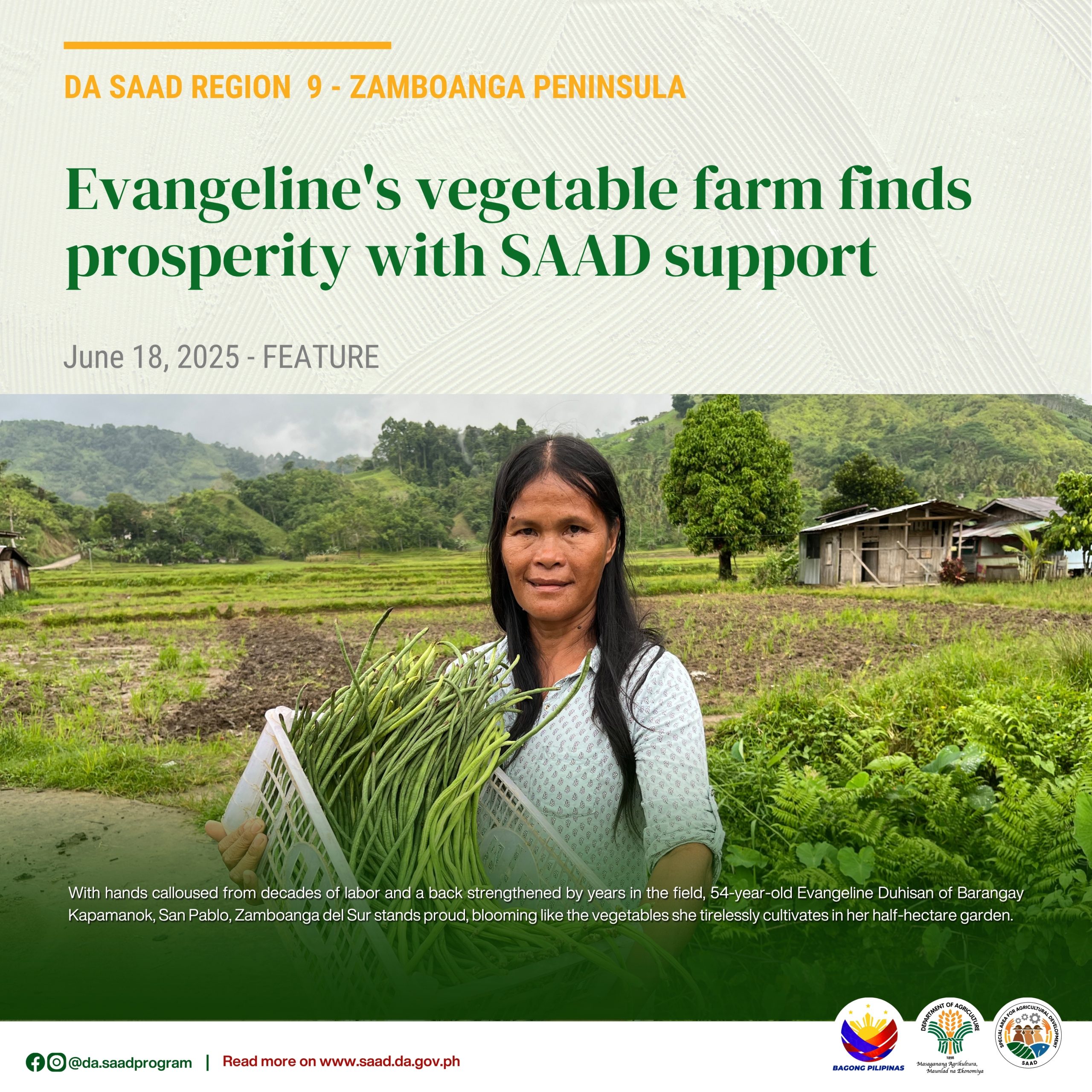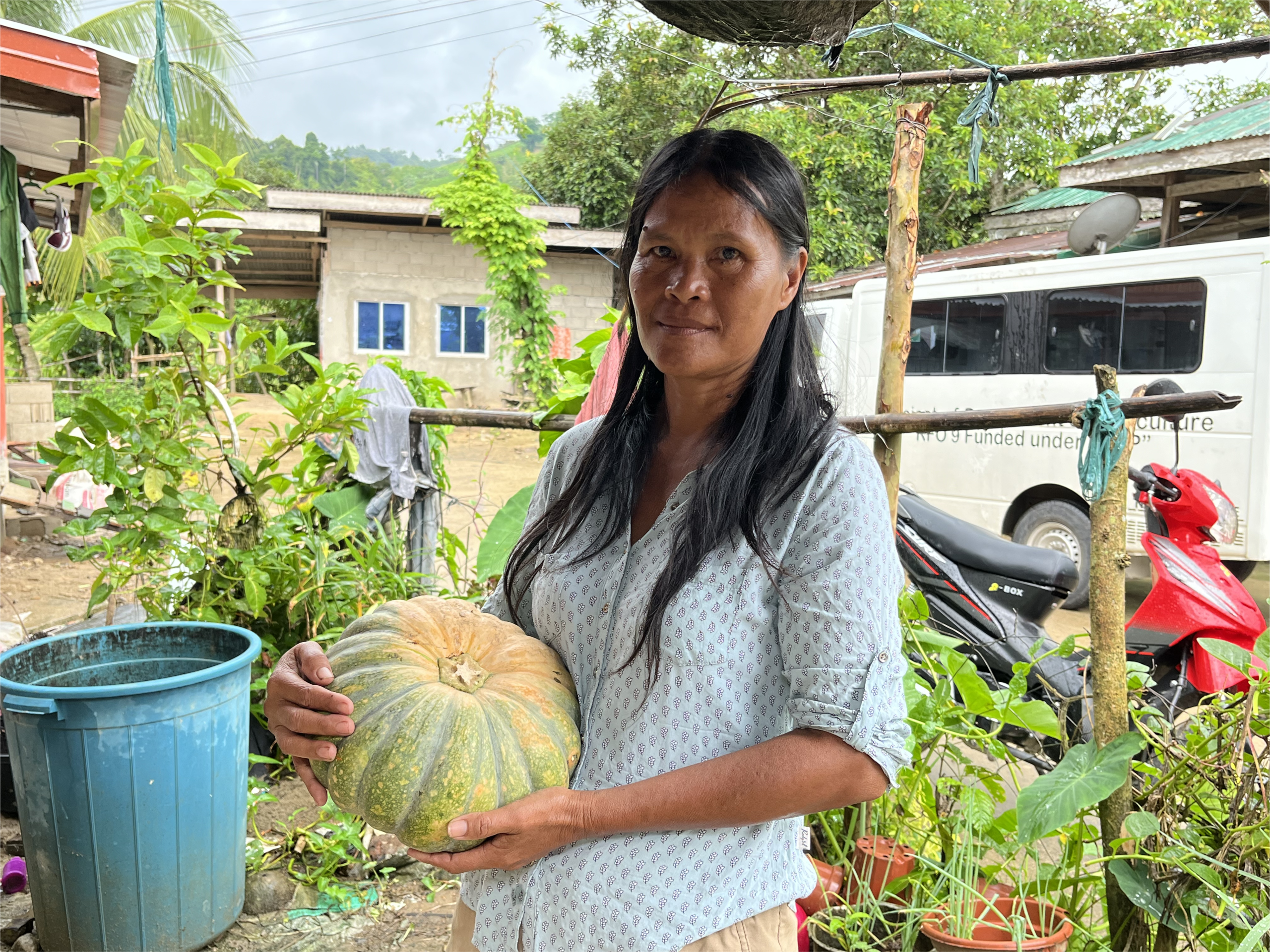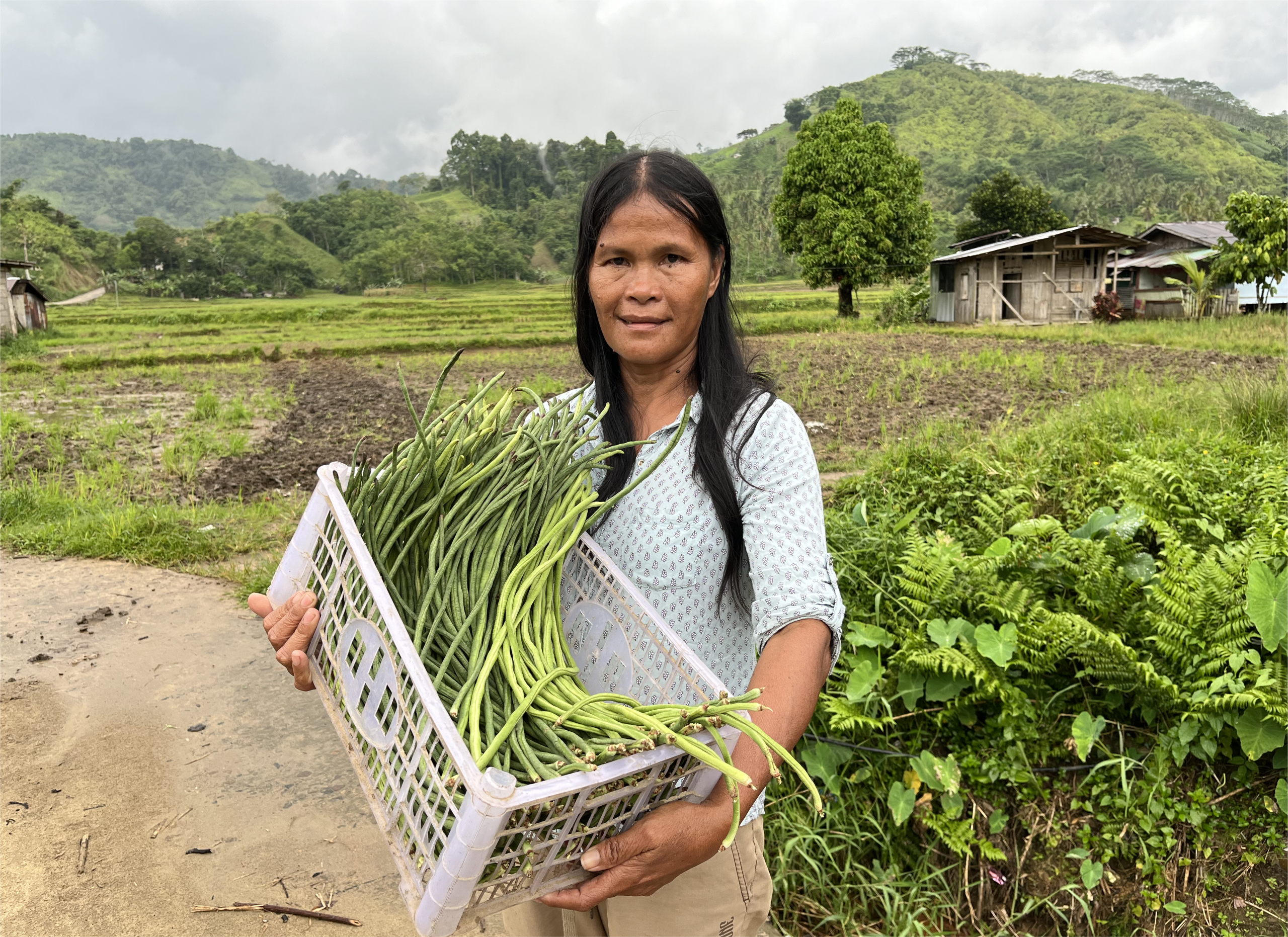With hands calloused from decades of labor and a back strengthened by years in the field, 54-year-old Evangeline Duhisan of Barangay Kapamanok, San Pablo, Zamboanga del Sur stands proud, blooming like the vegetables she tirelessly cultivates in her half-hectare garden.
Alongside her husband, Danilo, Evangeline has weathered life’s storms through hard work and love. The couple married 38 years ago and raised nine children — five daughters and four sons who grew up helping their parents in farming, while Danilo took on side jobs like farm labor, earning him Php 300 a day.
“Katong bag-o pa mi’ng minyo, abtik pa ang akong bana mag trabaho sa ubang umahan, nag buhi sad mi ug bibi, samtang gatanom og humay sa yuta sa amoang amo, nga bahinan mi og igo pang konsumo, ug ang pinaka gakitaan namo og income ang pag maintain sa mga utan sama sa talong, kalabasa, ug atsal. Kasagaran makatanom mi og 6,000 ka punuan, maka harvest mi’g taga 15 ka sako, mahalinan pud mi tag Php 5,000-Php 10,000 kada cycle,” she recalled.
(When we were newly married, my husband was very active in working on other people’s farms. We also raised ducks, while planting rice on our landlord’s land, where we were given a share enough for our consumption. Our main source of income came from maintaining vegetable crops like eggplant, squash, and pepper. We usually planted about 6,000 seedlings and were able to harvest around 15 sacks per cycle, earning us around Php 5,000 to Php 10,000 each time.)
Despite having multiple income streams, Evangeline still had a difficult time raising all nine of her children. On top of that, she had to borrow from private lending companies for capital just to purchase seeds and fertilizer, with interest eating up their profit.
But the couple passed through these hurdles with hard work and perseverance, until five of their children were already living their separate lives, years after ensuring all of them finished high school.
In 2024, the Lumponid Gardeners Association, of which Evangeline has been a member since 2002, was identified as a new beneficiary of the Department of Agriculture – Special Area for Agricultural Development (DA-SAAD) Program Phase 2.
They received Php 1,068,265 under the Vegetable Production Project, with interventions including 100 bags of vermicast, 10 wheelbarrows, 30 seedling trays, 120 cans of various vegetable seeds, such as eggplant, squash, string beans, and sweet pepper, as well as 300 bags of inorganic fertilizers, including complete fertilizers, diammonium phosphate, muriate of potash, and urea.
For Evangeline, she utilized one can of sweet pepper, two cans of squash, half a can of eggplant, and one-fourth kilogram of eggplant, as well as eight bags of various inorganic fertilizers and three bags of vermicast, including chemicals and a drum; all enough for their half-hectare garden.The couple planted these seeds in December 2024, hoping to earn a bigger income from the free inputs provided by the program.
Though they faced intense heat during the planting season, Evangeline was undeterred. “Di man mi bag-o aning utanan, mao’ng kabalo na mi sa among buhaton para atimanon ang tanom, pero ang training kabahin sa pag sugpo sa mga problema sa utan, naka-tabang gyud og dako sa amoa. Katong grabeng init, wala jud mi hunong sa pag bubo sa utan mao’ng kalooy sa Ginoo mabungahon jud among harvest,” she said.
(We’re not new to vegetable farming, so we already know what to do to take care of the crops. But the training on how to manage problems in vegetable production really helped us a lot. During the extreme heat, we didn’t stop watering the vegetables, and by God’s grace, our harvest turned out to be fruitful.)
After three months of hard work, they finally tasted the fruit of their labor. From February to May this year, they began harvesting eggplant, sweet pepper, squash, and string beans. For the entire cycle, they were able to produce 266 kilograms of eggplants, 10 kilograms of string beans, 35 kilograms of squash, and 138 kilograms of sweet pepper. These yielded a total income of Php 33,940 — their highest yet.
Previously, their earnings from a typical production cycle hovered around Php 5,000. This season marked a sixfold increase, driven largely by the high value of sweet pepper and improved crop management.
They sold their produce in Pagadian City, transported by a multicab owned by their eldest daughter, who also delivers balut in the city. The balut business, which started from the ducks the couple maintained, is now continued by their daughter.
“Dako jud kaayo’g tabang ang SAAD sa akoa kay sauna mangutang ko og capital, halos tablahon ra sa akong income ang giutang, pero karon nabati jud namo ang dako nga halin tungod kay wala na mi gagasto sa capital, igo nalang jud mi mag kugi,” Evangeline expressed.
(The SAAD has been really helpful to me because before, I used to borrow capital, and I would spend almost all of my income just to pay off the loan. But now, we can really feel the big profit because we no longer have to spend on capital; we just focus on working hard.)
Evangeline also shared that as part of the association’s sustainability scheme, they must return 10% of their income to the association, so the group has savings. Evangeline gave Php 00 to the association.She used the income to purchase feeds for her pigs, as well as for their daily needs and other necessities.
As they start a new planting cycle this June, Evangeline looks back at how far they’ve come. With five of their children already married and others still in school, she feels proud of what they’ve achieved. For her, the real reward isn’t just the crops- they are the life lessons and hard work that shaped her family. ###


